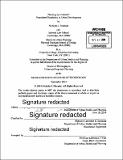| dc.contributor.advisor | Lawrence E. Susskind. | en_US |
| dc.contributor.author | Marantz, Nicholas J | en_US |
| dc.contributor.other | Massachusetts Institute of Technology. Department of Urban Studies and Planning. | en_US |
| dc.coverage.spatial | n-us-ca n-us-ny | en_US |
| dc.date.accessioned | 2015-04-08T18:02:02Z | |
| dc.date.available | 2015-04-08T18:02:02Z | |
| dc.date.copyright | 2014 | en_US |
| dc.date.issued | 2014 | en_US |
| dc.identifier.uri | http://hdl.handle.net/1721.1/96454 | |
| dc.description | Thesis: Ph. D. in Urban and Regional Planning, Massachusetts Institute of Technology, Department of Urban Studies and Planning, 2014. | en_US |
| dc.description | Cataloged from PDF version of thesis. | en_US |
| dc.description | Includes bibliographical references (pages 320-365). | en_US |
| dc.description.abstract | At the turn of the twenty-first century, a new term entered the lexicon of urban redevelopment: the community benefits agreement (CBA). Although the term has been applied to a variety of arrangements, it frequently refers to a set of written commitments between a developer and organizations claiming to represent residents who would be affected by a development project. In return for political support from such organizations, developers offer assurances regarding benefits such as affordable housing, jobs, amenities, and environmental quality. Despite limited evidence, CBAs have attracted widespread attention, both positive and negative. My dissertation details the emergence and use of CBAs in Los Angeles and New York City, the two cities where these tools have been most extensively deployed. My findings indicate that many claims concerning the CBAs as mechanisms of redistribution and political mobilization have been overstated. This analysis suggests that even widely praised CBAs can exacerbate the opacity of the legal and financial arrangements undergirding urban development. Planners should be alert to the potentially deleterious consequences of such opacity for democracy and resource distribution. | en_US |
| dc.description.statementofresponsibility | by Nicholas J. Marantz. | en_US |
| dc.format.extent | 365 pages | en_US |
| dc.language.iso | eng | en_US |
| dc.publisher | Massachusetts Institute of Technology | en_US |
| dc.rights | M.I.T. theses are protected by copyright. They may be viewed from this source for any purpose, but reproduction or distribution in any format is prohibited without written permission. See provided URL for inquiries about permission. | en_US |
| dc.rights.uri | http://dspace.mit.edu/handle/1721.1/7582 | en_US |
| dc.subject | Urban Studies and Planning. | en_US |
| dc.title | Planning by contract? : negotiated regulation in urban development | en_US |
| dc.title.alternative | Negotiated regulation in urban development | en_US |
| dc.type | Thesis | en_US |
| dc.description.degree | Ph. D. in Urban and Regional Planning | en_US |
| dc.contributor.department | Massachusetts Institute of Technology. Department of Urban Studies and Planning | |
| dc.identifier.oclc | 905969831 | en_US |
